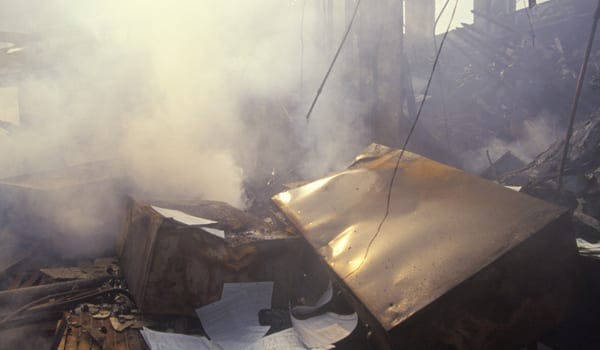The majority of Australian small businesses choose to go without Business Interruption insurance – but that’s often because they don’t realise the implications and the risk they’re taking on.
While small business owners are aware of the need to insure their property, equipment and stock, most do not protect themselves from the potentially crippling impact of being temporarily out of action.
If something happens that triggers your insurance policy such as a fire, burglary or malicious damage, there is a high likelihood that your business operation will be ‘interrupted’ and this will cut your profitability – often drastically.
For instance, this past summer’s spate of disasters, including the bushfires in Tasmania and the flooding in New South Wales and Queensland, caused many instances where damaged business premises where inaccessible, meaning repair crews couldn’t go to work. The lost hours of productivity piled up.
It’s situations like these when Business Interruption insurance is valuable.
What is Business Interruption insurance?
In simple terms, Business Interruption covers you for loss of profits. While your income may stop after an accident, storm, fire or other ‘event’, many business expenses will continue.
A small amount of property damage will often cause a significant disruption, turning your profitable business into one that’s operating in the red. What’s more, it can be many months before you’re profitable again.
It’s not uncommon for the Business Interruption component of an insurance claim to be greater than the cost of repairing the physical damage.
Many small business owners do not appreciate just how expensive it can be to have their trading interrupted – even for a short period. By the time they realise, it’s too late.
What does Business Interruption insurance cover?
Apart from lost income, Business Interruption can also cover the increased cost of working that is normally incurred as a result of the accident or event that has impacted your business.
This could be the cost of relocating to a temporary property while repairs are done, paying overtime, hiring equipment and additional temporary staff costs as you try to make up for lost time. It can also pay for advertising to tell your customers that you have just moved around the corner or that you are now ‘back in business’.
In other words, it covers costs you would not normally incur and that are necessary in order to get your business back to where it was before the event.
Indirect impact
Business Interruption not only covers interruption from events that impact your business directly, it also includes events that have an indirect impact.
A common example is if you operate in a shopping centre and there’s a fire in another part of the centre and that means customers cannot access your shop. Although your shop didn’t have the fire, your Business Interruption cover can be triggered and protect your profit.
What triggers Business Interruption insurance?
It’s important to understand that your Business Interruption cover is only triggered if it is caused by a specific event that you are insured for.
For example, if you are not covered for burglary and that is the cause of your loss of profit, then your Business Interruption cover is not triggered.
How does a Business Interruption claim work?
When you have a claim, your claims officer will need to calculate your ‘gross profit’ – something your accountant will be familiar with.
Basically this is your average annual gross revenue (plus any growth trends) minus the costs that you are not incurring because you are not operating or operating with a reduced capacity.
For example, if you have a fish and chip shop that is out of action due to storm damage, you will not have to buy seafood, soft drinks or pay for electricity or casual staff wages. These costs will not be included in your claim calculation because they are not being incurred.
But you will have to keep paying wages for permanent staff and probably other bills such as phone, insurance, council rates or rent (depending on the terms of your lease agreement). These costs will be covered along with your net profit.
Your insurer will need documentation that indicates what you would have been earning under normal circumstances. If the time you’re impacted is seasonally a peak period, this will be taken into account when calculating your claim.
While Business Interruption is almost universal for larger companies, the majority of small businesses in Australia elect not to take out Business Interruption insurance. Operating without Business Interruption insurance is a serious risk.
Your best business decision was to go into business. Having Business Interruption insurance is an investment worth considering as it can help put you back in business if things go wrong.

